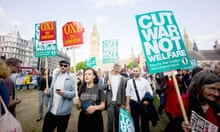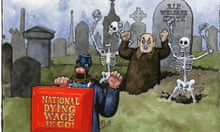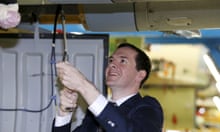George Osborne has claimed that his politically audacious budget, promising big rises in the minimum wage in return for a cut in welfare, represents “the new centre of British politics”.
As Labour struggled to calibrate an effective response – accepting the principle of the reforms but opposing the way in which they are implemented – the chancellor claimed his budget represented a “new settlement” with Britain.
Osborne told BBC Radio 4’s Today programme on Thursday: “What we are saying to business is ‘pay higher wages but you get lower taxes’. What we are saying to people is ‘you get a bigger pay cheque but there will be a less generous benefit system’ . What we are saying to the country is ‘we are going to spend less but we are going to live within our means’. That is the new settlement and I think it is the new centre of British politics.”
The chancellor said that Britain had a “low-pay problem” that had to be addressed, but he also said the welfare system was unsustainable.
Labour had said that hundreds of thousands of working people would be left reeling by cuts to working tax credits and would not be compensated by planned rises in the minimum wage.
The shadow chancellor, Chris Leslie, said on Thursday that the rug had been pulled from under their lives by what amounted to a work penalty that would deter people from getting jobs.
Although he said he would be delighted if the government wished to steal parts of the Labour manifesto by raising the minimum wage, he said the chancellor had sequenced the reforms the wrong way round so the cuts to tax credits preceded the pay rise.
Osborne insisted that his deal on the minimum wage rise coupled with cuts to tax credits would make a family with one full-time earner on the minimum wage better off.
The CBI’s director general, John Cridland, said the jury was out on the big rise in the minimum wage, but warned jobs might be lost in restaurants, hotels and the social care sector.
He said there had been no consultation over the proposals, and feared the independent Low Pay Commission had been politicised since it was being directed to raise the minimum wage to two-thirds of the median earnings regardless of the impact on the labour market.
The Treasury insisted the new minimum wage of £7.20 from next year for over-25s, rising to £9 by 2020, would not force employers to shed jobs.
There was also concern that the rise in the minimum wage would encourage EU migration to the UK and undermine the purpose of David Cameron’s key EU renegotiation objective – giving Britain the right to bar EU migrants from receiving tax credits for four years.
Osborne said his promise to lower corporation tax should mean that industry should accept his new settlement on wages, adding that he had cut taxes for small businesses and reduced their national insurance bills. He accepted the Office of Budget Responsibility had predicted his planned pay rises would lead to a loss of 60,000 jobs, but he said this was in the wider context of a predicted creation of 1m extra jobs.
“I am offering economic security to the country. I am offering businesses lower taxes but I am saying we have to be more productive, have higher wages and better skills.”
Asked about a quote from an anonymous cabinet minister who said “the technical term for what we are doing is kicking British business up their lazy arses”, Osborne laughed, but said businesses would now need to pay an apprenticeship levy to ensure the cost of training was properly funded.
He also denied that he was allowing his fiscal discipline to slip since he had given himself an extra year, to 2019-20, to bring the deficit into balance. He said the national debt would be falling lower than he planned before the general election. “The net effect is the deficit is reduced at the same pace – not faster, not slower – than in the last parliament.”
Leslie welcomed the principle of increasing pay as the best way of dealing with rising welfare. But he said the cuts to welfare were so large many people would be worse off. “The figures do not add up,” he said. He argued that the new living wage was a rebranding exercise, pointing out it applied to workers over 25 and working 35 hours a week.
He claimed a couple with two children, with one adult on full-time average earnings, would lose £2,000 a year in tax credits. For every £1 they gained with the minimum wage increase, they could lose £2 in tax credits.
Leslie said Labour planned to be a more intelligent opposition, and would accept the principle of an overall annual cap on welfare benefits. But he said Labour would not “meekly accept” whatever the government proposed.
Labour is nevertheless privately struggling to phrase a response that accepts the principle of the reforms but opposes the way in which they are being implemented.
Some Labour leadership candidates are urging the party also to look at the overall macroeconomic decisions and the extent to which the chancellor has moved on to Labour ground by delaying the speed with which the deficit will be cut, pointing out that the new timetable is not sharply different from what Ed Balls had proposed in the general election. Labour is also pointing to the huge tax rises in the budget, as well as extra public spending.






Comments (…)
Sign in or create your Guardian account to join the discussion